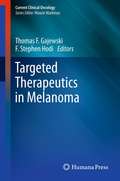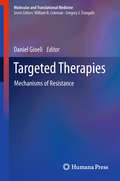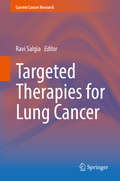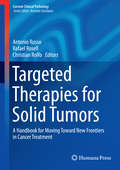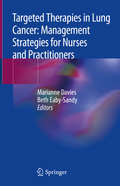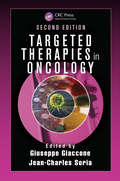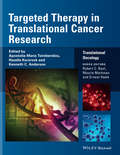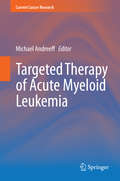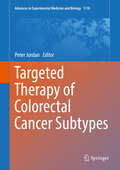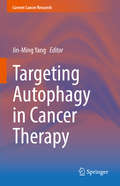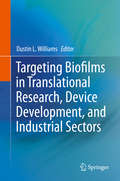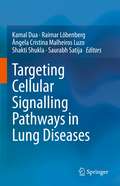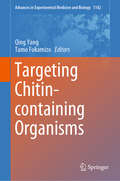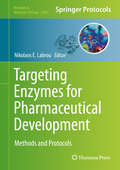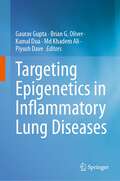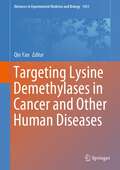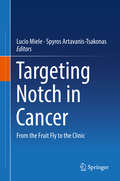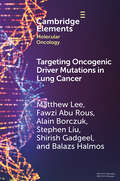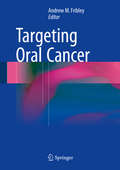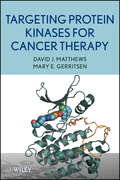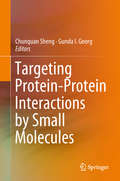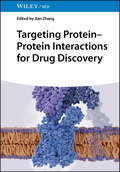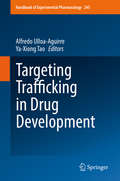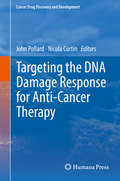- Table View
- List View
Targeted Therapeutics in Melanoma
by F. Stephen Hodi Thomas F. GajewskiMelanoma is an increasingly important public health problem. Although the cause of most malignant melanomas - over-exposure to ultraviolet light - is well known, effective treatment has remained challenging. The past several years have been marked by extraordinary developments in melanoma treatment in the arena of targeted therapeutics. This book describes these ground-breaking discoveries and their implications for clinical use. As melanoma biology is increasingly understood, so the development of targeted therapies for this disease is spurred ahead. This book covers both established signal transduction inhibitors and the fascinating emerging realm of molecularly-guided immunotherapies. This benchmark book provides the most up-to-date information on the new breed of melanoma therapies. Composed of the works of major researchers and clinicians, this book offers new insights, novel approaches, and promising data for effective treatment planning. Illuminating the latest advances in the field, it is a solid resource for clinical oncologists, translational scientists, and basic cancer researchers.
Targeted Therapies
by Daniel GioeliThis volume explores the mechanisms of resistance to targeted therapeutics. The focus is on the cancer cell signaling network, although other mechanisms of resistance including target mutation, and new areas of study such as cancer stem cells are included. Targeted Therapies: Mechanisms of Resistance highlights examples of changes in the signaling network in response to inhibition of a signaling event and underscores the importance in having a mechanistic understanding of the signaling network in cancer for developing effective targeted cancer therapies. Moreover, cutting edge tools to analyze the cell signaling network will be discussed. This includes the leading edge of techniques as well as computational biology and systems theory. This volume provides the reader with both an overview as well as a detailed perspective on the mechanisms of resistance to targeted therapeutics and will be of great value to the oncologist, the physician-scientist treating patients and the translational scientist working on any aspect of targeted therapeutics.
Targeted Therapies for Lung Cancer (Current Cancer Research)
by Ravi SalgiaThis book contextualizes translational research and provides an up to date progress report on therapies that are currently being targeted in lung cancer. It is now well established that there is tremendous heterogeneity among cancer cells both at the inter- and intra-tumoral level. Further, a growing body of work highlights the importance of targeted therapies and personalized medicine in treating cancer patients. In contrast to conventional therapies that are typically administered to the average patient regardless of the patient’s genotype, targeted therapies are tailored to patients with specific traits. Nonetheless, such genetic changes can be disease-specific and/or target specific; thus, the book addresses these issues manifested in the somatically acquired genetic changes of the targeted gene. Each chapter is written by a leading medical oncologist who specializes in thoracic oncology and is devoted to a particular target in a specific indication. Contributors provide an in-depth review of the literature covering the mechanisms underlying signaling, potential cross talk between the target and downstream signaling, and potential emergence of drug resistance.
Targeted Therapies for Solid Tumors
by Antonio Russo Rafael Rosell Christian RolfoThis volume provides readers a comprehensive and state-of-the-art overview about the range of applications of targeted therapies for solid tumors. The sections of the book have been structured to review the oncogene addicted tumors, the pharmacology and clinical development of new molecularly targeted agents, the use of biomarkers as prognostic, predictive and surrogate endpoints, and the evaluation of tumor response and specific malignancies treated with targeted agents. The book also covers some of the newest developments in cancer therapy that are not adequately covered by any current available literature. Written by recognized experts in the field, Targeted Therapies for Solid Tumors: A Handbook for Moving Toward New Frontiers in Cancer Treatment provides a unique and valuable resource in the field of molecular oncology, both for those currently in training, and for those already in clinical or research practice.
Targeted Therapies in Lung Cancer: Management Strategies for Nurses and Practitioners
by Marianne Davies Beth Eaby-SandyThis book aims to educate nurses and advanced practice providers (APP’s) about known mutations, availability of targeted therapy and the management of patients with non-small cell lung cancer (NSCLC). It will educate nurses and practitioners about the scope of therapy to assure safe and effective lung cancer treatment. In this era of personalized medicine, nurses and APP’s are responsible for guiding patients from diagnosis through treatment. This starts with the identification of patients that can benefit from these therapies, the key role of biopsy acquisition (ie. what to test, when and how often) and treatment selection based on the mutation identified. Readers will learn about the mechanisms of action, administration, potential adverse side effects and unique management strategies for these targeted agents. Lung cancer continues to be the leading cause of cancer death in the United States and worldwide. Recent advances in the identification of specific oncogenic mutations that drive cancer development, growth and metastasis have led to major paradigm shifts in lung cancer treatment. Sophisticated methods are required to identify specific mutations at the time of diagnosis. This book explains how molecularly targeted therapies have been developed that target these drivers. To date, several tyrosine kinase inhibitors have been approved to target the epidermal growth factor receptor (EGFR), EML4-ALK ,ROS1 and BRAF. Most recently, immune checkpoint inhibitors have been approved with some indication that efficacy may be enhanced for patients who overexpress PD-L1. While some driver mutations have been identified, there is ongoing investigation into additional mutations. In the case of driver mutations, lung cancers will develop resistance to therapy. This book provides nurses and APP’s with the mechanisms of resistance that have been identified such as T790 mutation and many others in the EGFR mutation, and shows how the next level of drug development is focused on identifying mechanisms of resistance and development of new agents that overcome these mutations. With this book in hand, nurses and practitioners will be able to navigate patients through this ever expanding field of lung cancer treatment.
Targeted Therapies in Oncology
by Giuseppe Giaccone Jean-Charles SoriaSince the last edition of this book, major advances have been made in our understanding of key pathways that control tumor progression. This has led to the development of new anticancer agents that have the ability to block the activity of proteins involved in neoplastic cell development and proliferation. Targeted Therapies in Oncology, Second Edi
Targeted Therapy in Translational Cancer Research
by Kenneth C. Anderson Ernest Hawk Maurie Markman Apostolia-Maria Tsimberidou Robert C. Bast Razelle KurzrockTargeted Therapy in Translational Cancer Research for the Translational Oncology series provides a comprehensive overview of recent developments in our understanding of tumor biology, elucidates the roles of targets and pathways involved in carcinogenesis, and describes current state-of-the-art anticancer therapy, as well as the most promising areas of translational research and targeted therapy. Introduces cutting-edge 'bench to bedside and back' breakthroughs which have transformed the diagnosis, prognosis, and treatment of cancer Covers basic principles of targeted therapy, including immunotherapy and the roles of cancer stem cells, the microenvironment, angiogenesis, epigenetics, microRNAs, and functional imaging in precision medicine Summarises major advances in therapeutic management of hematologic malignancies and solid tumors using conventional therapy, targeted therapy, immunotherapy, or novel treatment modalities
Targeted Therapy of Acute Myeloid Leukemia
by Michael AndreeffThis book provides an unprecedented overview of "Targeted Therapies" for acute myeloid leukemias. It aims at an almost comprehensive coverage of the diverse therapeutic strategies that have been developed during the last decade and are now being evaluated in early clinical trials. Paired and authoritative chapters by leading research scientists and clinicians explain basic concepts and clinical translation of topics that include the underlying genetic and proteomic abnormalities of AML, the development of novel nucleoside analogues, the roles of microRNAs, apoptosis regulators Bcl-2 and p53 and of critical cell signaling proteins such as PIM, FLT3, Raf/MEK, PI3K/AKT/mTOR and aurora kinases. Chapters on epigenetic mechanisms, nuclear receptors, cell surface antigens, the hypoxic leukemia microenvironment, stem cells and leukemia metabolism provide insights into leukemia cell vulnerabilities. Cell therapies utilizing T-, NK- and mesenchymal stem cells and progress in hematopoietic transplantation strategies round up this overview of the multi-dimensional therapeutic landscape in which leukemia specialists develop treatment strategies that are expected to make "leukemia history" in the near future.
Targeted Therapy of Colorectal Cancer Subtypes (Advances in Experimental Medicine and Biology #1110)
by Peter JordanColorectal cancer (CRC) is a leading cause of cancer-related death worldwide. Recent years have increased significantly our understanding of the genetic alterations that can underlie CRC, but also unraveled the molecular heterogeneity of the disease. Although a simple correlation between genetic pathways, histopathological features and clinical outcome cannot be established, the heterogeneity of CRC is also an opportunity for the development of targeted therapeutic approaches, able to treat an individual tumor with higher efficiency and less toxic side effects. One CRC subtype is characterized by high mutation rates (MSI-H), DNA methylation changes (CIMP-H), mutation in the BRAF oncogene and occurrence of serrated adenomas in the proximal colon. Other groups prevail in the distal colon and consist of either adenomatous polyps with chromosomal aberrations (CIN) and WNT pathway activation, or carry frequent KRAS mutation and metabolic deregulation, or have strong mesenchymal and infiltrative characteristics. Characterization of driver-mutation events in these CRC subgroups has led to the development of specific drugs targeting, for example, the MAPK pathway, but initial clinical trials have revealed unexpected response rates. The collection of chapters in this volume address the biology of specific CRC subtypes and how these may be targeted to improve precision therapy and clinical benefit for the patients.
Targeting Autophagy in Cancer Therapy
by Jin-Ming YangThis volume will detail the current state and perspectives of autophagy-based cancer therapy. Covering a wide range of topics, it will include an overview of autophagy as a therapeutic target in cancer, autophagy modulators as cancer therapeutic agents, implications of micro-RNA-regulated autophagy in cancer therapy, modulation of autophagy through targeting PI3 kinase in cancer therapy, targeting autophagy in cancer stem cells, and roles of autophagy in cancer immunotherapy. In addition, the volume will review applications of system biology and bioinformatics approaches to discovering cancer therapeutic targets in the autophagy regulatory network. The volume will be beneficial for a variety of basic and clinical scientists, including cancer biologists, autophagy researchers, pharmacologists, and clinical oncologists who wish to delve more deeply into this field of cancer research. This volume will be the first book to focus solely on autophagy as a target in cancer therapy. As well, it will comprehensively discuss the roles of autophagy in most currently available cancer treatments.
Targeting Biofilms in Translational Research, Device Development, and Industrial Sectors
by Dustin L. WilliamsThis book offers a much-needed discussion on the targeting of biofilm-related infections. Chapters include discussions on the impact of biofilm on medical implants, industrial applications, as well as wound and tissue infections. It also offers discussions on regulatory management for industrial sectors and medical environments. Given that there continues to be a paucity of effective antimicrobial products, devices, and coatings in clinical and industrial use that effectively reduce rates of infection or biofilm-related problems, Targeting Biofilms in Translational Research, Device Development, and Industrial Sectors, offers a fresh and much-needed perspective aimed at helping create healthier controlled environments and safer devices. This comprehensive book is indispensable for industrial and academic translational researchers, device developers, and regulatory experts looking to create more effective antimicrobial products.
Targeting Cellular Signalling Pathways in Lung Diseases
by Shakti Shukla Kamal Dua Raimar Löbenberg Ângela Cristina Malheiros Luzo Saurabh SatijaThe book comprehensively reviews and provides detailed insight into the cellular and molecular signalling mechanisms involved in pathophysiology of various respiratory diseases, towards developing effective therapeutic strategies in the management and treatment of lung disease. It also covers promising advances in the field of therapeutics that could lead to novel clinical therapies capable of preventing or reversing the disease features including novel strategies for targeting chronic lung diseases using advanced drug delivery systems. Importantly, the book examines the significance and relevance of the plant extracts and their constituents with therapeutic efficiencies against lung diseases. As such, the book offers a blend of translational, biological, chemical, and drug delivery aspects relevant to respiratory diseases, thus, offering a valuable resource for pulmonologists and translational researchers working in the field of pulmonary biology and respiratory medicine.
Targeting Chitin-containing Organisms (Advances in Experimental Medicine and Biology #1142)
by Qing Yang Tamo FukamizoThis book provides a comprehensive overview of chitin biology and chitin metabolism related enzymes. Chitin, the second most abundant biopolymer in nature after to cellulose, is a linear biopolymer composed of β-1,4-linked N-acetylglucosamine (GlcNAc), and an essential component in the exoskeletons of insects, mites, ticks and crustaceans, the egg shells of parasitic nematodes, and fungal cell walls. Although some chitin-containing organisms are a threat to human health, food safety and agricultural production, non-chitin containing organisms like humans, mammals and plants have an innate immune response to these hazardous organisms. The book provides researchers and students with information on the recent research advances concerning the biology of chitin-containing organisms as well as cross-talks between chitin-containing and non-chitin-containing organisms. Highlighting chitin remodeling enzymes and inhibitors, it also offers drug developers essential insights into designing specific molecules for the control of hazardous chitin-containing organisms.
Targeting Enzymes for Pharmaceutical Development: Methods and Protocols (Methods in Molecular Biology #2089)
by Nikolaos E. LabrouThis volume explores detailed methods and experimental protocols evaluating the effect of a compound or a mixture of compounds on the action of enzymes that are significant targets in pharmaceuticals. Consisting of three sections, the book delves into recent biocomputing and bioinformatics protocols, state-of-the art modern biophysical, electrophoretic, and chromatographic methods and high-throughput screening approaches, as well as detailed protocols and examples of the inhibition analysis and evaluation of selected enzymes. Written for the highly successful Methods in Molecular Biology series, chapters include introductions to their respective topics, lists of the necessary materials and reagents, step-by-step, readily reproducible laboratory protocols, and tips on troubleshooting and avoiding known pitfalls. Authoritative and cutting-edge, Targeting Enzymes for Pharmaceutical Development: Methods and Protocols serves as a vital reference for academics and industry professionals working on expanding our understanding of the wide range of important enzyme targets.
Targeting Epigenetics in Inflammatory Lung Diseases
by Gaurav Gupta Kamal Dua Brian G. Oliver Md Khadem Ali Piyush DaveThis book discusses the role of epigenetics in pathogenesis of different pulmonary diseases, including chronic obstructive pulmonary disease, lung cancer, pulmonary tuberculosis, idiopathic pulmonary fibrosis and pulmonary infections. It also explores post-translational modifications in DNA and histones for improving the understanding of lung diseases. This book helps in understanding the epigenetic mechanisms towards the development of novel diagnostic and therapeutic approaches. Further, the book provides insight into the underlying molecular mechanisms involved in the epigenetic regulation of inflammation, which may have novel implications in designing small molecule inhibitors that target the epigenetic machinery for the effective treatment of a variety of inflammation‑related diseases. This book is a valuable resource for academics, research and industry professionals working in respiratory biology.
Targeting Lysine Demethylases in Cancer and Other Human Diseases (Advances in Experimental Medicine and Biology #1433)
by Qin YanThis book provides a comprehensive summary of our current knowledge on lysine demethylases, a class of epigenetic regulators. It takes the reader on an exciting journey spanning the past two decades, starting from the initial discovery and characterization of these enzymes and leading up to the development of their small molecule modulators. These modulators have shown promise in clinical trials and hold great potential to improve patient outcomes. The book captures the progress made in this field and highlights the significant advancements that have paved the way for potential therapeutic applications.The book covers a wide range of topics, spanning both basic biology and clinical implications associated with lysine demethylases. It offers a comprehensive historical and conceptual framework for the discovery and characterization of similar epigenetic enzymes or modulators. Chapter one serves as an introductory overview, providing insights into the general characteristics and functions of lysine demethylases. In subsequent chapters, specifically chapters two to eight, each major family of lysine demethylases is individually explored in depth. By providing in-depth insights into the functional aspects of these enzymes, the book allows readers to grasp their significance in regulating cellular processes and influencing pathogenesis. Moreover, the book goes beyond fundamental knowledge and also explores the development of diagnostic and therapeutic strategies related to lysine demethylases. It highlights the potential for utilizing these enzymes as therapeutic targets for the treatment of various diseases, including cancer and infectious diseases. Additionally, the book highlights future directions aimed at further unraveling the roles of lysine demethylases and translating these findings into the clinic.
Targeting Notch in Cancer: From the Fruit Fly to the Clinic
by Lucio Miele Spyros Artavanis-TsakonasThe serendipitously discovered link between developmental biology and cancer, touched of an explosion of discoveries on the role of Notch in human malignancies, including every aspect of cancer biology, from control of differentiation, proliferation and apoptosis in transformed cells to angiogenesis, tumor-stroma interaction and anti-cancer immune responses. A number of observations have revealed that Notch even plays a role in the renewal of cancer stem cells and tumor initiating cells, which are thought to be a major cause of resistance to treatment. Targeting Notch in Cancer will provide researchers, oncologists, pharmacologists and students with a detailed understanding of the intricate cross-talk between Notch and other pathways of therapeutic interest so to better design rational drug combinations for specific diseases and disease subsets. Divided into two parts, Part I describes in detail what we know about the genetics, molecular biology, biochemistry and structural biology of Notch, as well as the role of Notch in such processes as angiogenesis and immune surveillance. Without insights gained from these basic studies, rational targeting of Notch in human disease would be impossible. Part II describes the role of Notch and ongoing experimental therapeutic efforts in the most important subtypes of human cancers, organized in a clinically oriented fashion by organs and systems affected
Targeting Oncogenic Driver Mutations in Lung Cancer (Elements in Molecular Oncology)
by Matthew Lee Shirish Gadgeel Balazs Halmos Fawzi Abu Rous Alain Borczuk Stephen LiuThe recent advances in the field of molecular diagnostic techniques have led to the identification of targetable alterations prompting a paradigm shift in the management of non-small cell lung cancer (NSCLC) and an era of precision oncology. This Element highlights the most clinically relevant oncogenic drivers other than EGFR, their management and current advancements in treatment. It also examines the different challenges in resistance to targeted therapies and diagnostic dilemmas for each oncogenic driver and the future direction of NSCLC management.
Targeting Oral Cancer
by Andrew M. FribleyThis book provides research-oriented care providers with up-to-date information on the oral cancer patient population, the ways in which we are treating them, and the scientific approaches being pursued in order to improve survival and reduce treatment-related morbidity. The text is organized into three sections covering epidemiology and management, cancer development and biomarkers, and breaking developments and novel approaches for drug discovery. The first section includes discussion of the emerging role of HPV in oral cancer and explains the surgical, chemotherapy and radiation approaches to treatment. Aspects such as molecular progression, the role of cancer stem cells in tumor development, and the value of various biomarkers are then examined. The final section is devoted to the latest advances and covers, among other topics, current clinical trials, emerging drug targets, and targeting of the unfolded protein response and of mediators of coagulation.
Targeting Protein Kinases for Cancer Therapy
by David J. Matthews Mary E. GerritsenAn expert guide to targeting protein kinases in cancer therapyResearch has shown that protein kinases can instigate the formation and spread of cancer when they transmit faulty signals inside cells. Because of this fact, pharmaceutical scientists have targeted kinases for intensive study, and have been working to develop medicinal roadblocks to sever their malignant means of communication.Complete with full-color presentations, Targeting Protein Kinases for Cancer Therapy defines the structural features of protein kinases and examines their cellular functions. Combining kinase biology with chemistry and pharmacology applications, this book enlists emerging data to drive the discovery of new cancer-fighting drugs. Valuable information includes:Comprehensive overviews of the major kinase families involved in oncology, integrating protein structure and function, and providing important tools to assist pharmaceutical researchers to understand and work in this dynamic area of cancer drug researchFocus on small molecule inhibitors as well as other therapeutic modalitiesDiscussion of kinase inhibitors that have entered clinical trials for the treatment of cancer, with an emphasis on molecules that have progressed to late stage clinical trials and, in a few cases, to marketProviding a platform for further study, this important work reviews both the successes and challenges of kinase inhibitor therapy, and provides insight into future directions in the war against cancer.
Targeting Protein-Protein Interactions by Small Molecules
by Chunquan Sheng Gunda I. GeorgThis book comprehensively reviews the state-of-the-art strategies developed for protein-protein interaction (PPI) inhibitors, and highlights the success stories in new drug discovery and development. Consisting of two parts with twelve chapters, it demonstrates the design strategies and case studies of small molecule PPI inhibitors. The first part discusses various discovery strategies for small molecule PPI inhibitors, such as high throughput screening, hot spot-based design, computational approaches, and fragment-based design. The second part presents recent advances in small molecule inhibitors, focusing on clinical candidates and new PPI targets. This book has broad appeal and is of significant interest to the pharmaceutical science and medicinal chemistry communities.
Targeting Protein-Protein Interactions for Drug Discovery
by Jian ZhangUp-to-date reference surveying the latest advances in the structural understanding of protein-protein interactions and developments in drug discovery and therapeutics Targeting Protein–Protein Interactions for Drug Discovery provides a systematic and comprehensive overview of protein-protein interactions (PPIs), reviewing foundational concepts, advanced methodologies, and emerging therapeutic strategies, reflecting the multidisciplinary nature of PPI research. This book discusses computational methods for predicting PPI structures, with a special emphasis on protein docking and deep learning-based approaches, diverse chemical scaffolds for PPI modulation, including foldamers as inhibitors of aberrant PPIs and sulfonyl-γ-AApeptides as novel modulators, and the development and application of stapled peptides as modulators of intracellular PPIs, offering enhanced stability, binding affinity, and cellular permeability. Readers will also find information on cyclic peptides, focusing on their unique conformational stabilization and therapeutic potential across a range of diseases, small molecule inhibitors targeting BCL-family proteins, revealing their potential in cancer therapy, molecular glues as activators for PPIs, categorized into degraders, stabilizers, and inhibitors based on their biological effects, and the targeting of the APC–Asef interaction for drug discovery in colorectal cancer therapy, offering a case study of specificity and clinical relevance. Targeting Protein–Protein Interactions for Drug Discovery explores sample topics including: Challenges and strategies of drug discovery targeting PPIs, including high-throughput screening and structure-based drug design Fluorescence resonance energy transfer (FRET) technology, a powerful tool for real-time analysis of molecular interactions in live cells Utility of mass spectrometry (MS) for large-scale mapping of PPI networks with high sensitivity and resolution Proximity ligation assays (PLA) for detecting PPIs in situ, emphasizing spatial precision and adaptability for multiplexed detection Application of surface plasmon resonance (SPR) for characterizing PPI specificity, affinity, and kinetics Exploring both classical and novel approaches to PPI characterization and modulation, Targeting Protein–Protein Interactions for Drug Discovery offers a comprehensive reference for researchers aiming to unlock the therapeutic potential of PPIs along with educators and students engaged in the study of cellular mechanisms, drug discovery, and biotechnology.
Targeting Trafficking in Drug Development (Handbook of Experimental Pharmacology #245)
by Alfredo Ulloa-Aguirre Ya-Xiong TaoCellular trafficking is only recently identified as a site for therapeutic intervention. This book provides up to date information on the mechanism for exploiting this area for drug development as well as a clear understanding of the individual components of cellular trafficking. The authors are experts in their areas and the book features tables and figures that enable comparison and clear understanding.
Targeting the Broadly Pathogenic Kynurenine Pathway
by Sandeep MittalTryptophan metabolism via kynurenine pathway plays a critical role in both health and a variety of human diseases. This book highlights the known associations between kynurenine pathway and various disease states, as well as examines the current status of drug development and clinical trials of compounds known to alter tryptophan metabolism. The research plays a critical role in molecular targeted therapies directed at altering the kynurenine pathway of tryptophan metabolism. The initial and rate-limiting step of tryptophan metabolism is mediated by one of two enzymes, tryptophan-2,3-dioxygenase (TDO; predominantly in the liver, but also in the brain) and indoleamine-2,3-dioxygenase (IDO; in a host of tissues in response to immune activation). Targeting the enzymes IDO and TDO, as well as other downstream effectors would therefore be likely to generate novel treatment options that would be helpful in a wide variety of clinical settings. This book provides a unique bridge between basic mechanistic understanding of the role of the kynurenine pathway with translational applications and clinical relevance. It will explore the indications that tryptophan metabolism is a potential biomarker of disease activity, can contribute to local and possibly systemic immune suppression in cancer, and is an attractive target for which a variety of inhibitors are readily available.
Targeting the DNA Damage Response for Anti-Cancer Therapy (Cancer Drug Discovery and Development)
by Nicola Curtin John PollardOver the past decade a complex role for DNA damage response (DDR) in tumorigenesis has emerged. A proficient DDR has been shown to be a primary cause for cellular resistance to the very many DNA damaging drugs, and IR, that are widely used as standard-of-care across multiple cancer types. It has also been shown that defects in this network, predominantly within the ATM mediated signaling pathway, are commonly observed in cancers and may be a primary event during tumorigenesis. Such defects may promote a genomically unstable environment, facilitating the persistence of mutations, any of which may provide a growth or survival advantage to the developing tumor. In addition, these somatic defects provide opportunities to exploit a reliance on remaining repair pathways for survival, a process which has been termed synthetic lethality. As a result of all these observations there has been a great interest in targeting the DDR to provide anti-cancer agents that may have benefit as monotherapy in cancers with high background DNA damage levels or as a means to increase the efficacy of DNA damaging drugs and IR. In this book we will review a series of important topics that are of great interest to a broad range of academic, industrial and clinical researchers, including the basic science of the DDR, its role in tumorigenesis and in dictating response to DNA damaging drugs and IR. Additionally, we will focus on the several proteins that have been targeted in attempts to provide drug candidates, each of which appear to have quite distinct profiles and could represent very different opportunities to provide patient benefit.
